What It Means to Be Moral: Why Religion Is Not Necessary for Living an Ethical Life Hardcover – September 10, 2019
by Phil Zuckerman (Author)
4.4 out of 5 stars 36 ratings
--
"A thoughtful perspective on humans' capacity for moral behavior." ―Kirkus Reviews
"A comprehensive introduction to religious skepticism." ―Publishers Weekly
In What It Means to Be Moral: Why Religion Is Not Necessary for Living an Ethical Life, Phil Zuckerman argues that morality does not come from God. Rather, it comes from us: our brains, our evolutionary past, our ongoing cultural development, our social experiences, and our ability to reason, reflect, and be sensitive to the suffering of others.
By deconstructing religious arguments for God-based morality and guiding readers through the premises and promises of secular morality, Zuckerman argues that the major challenges facing the world today―from global warming and growing inequality to religious support for unethical political policies to gun violence and terrorism―are best approached from a nonreligious ethical framework. In short, we need to look to our fellow humans and within ourselves for moral progress and ethical action.
“In this brilliant, provocative, and timely book, Phil Zuckerman breaks down the myth that our morality comes from religion―compellingly making the case that when it comes to the biggest challenges we face today, a secular approach is the only truly moral one.” ―Ali A. Rizvi, author of The Atheist Muslim
--
Editorial Reviews
Review
Praise for What It Means to Be Moral
"A thoughtful perspective on humans' capacity for moral behavior." ―Kirkus Reviews
"Sociologist Zuckerman (Society Without God) presents a prodigiously well-supported argument against religion . . . A comprehensive introduction to religious skepticism." ―Publishers Weekly
"Zuckerman draws on research to show why and how secular morality works . . . [A] first-resort work on its subject." ―Booklist
"Most of us nonbelievers know morality when we see it, but that’s no help when yet another devout friend or family member asks, 'How can anyone know what’s good―let alone do it―without God?' Phil Zuckerman’s surprisingly entertaining new book, on the other hand, is a huge help. Zuckerman doesn’t just explain how and why secular morality works; he makes a powerful case that it works better than any and every religious code and is uniquely suited to help us solve the world’s biggest problems. Here’s your chance to stand tall and answer the naysayers, once and for all, literally for goodness’ sake." ―Bart Campolo, coauthor of Why I Left, Why I Stayed
"Clear, compassionate, and concise . . . Zuckerman’s book serves as a valuable tool and source of inspiration and guidance in creating a world based on humanist ethics, not religious dogma." ―Becky Garrison, The Humanist
"You’re going to want to read this one. It’s a thoughtful and thorough analysis of a subject that is usually dealt with in sound bites." ―Hemant Mehta, Friendly Atheist
"As humanity moves forward, using science and reason to better understand the universe, many people nevertheless reflexively assume that ancient religions are needed for ethical living. Phil Zuckerman dismantles those assumptions brilliantly in What It Means to Be Moral, demonstrating that morality is perfectly consistent with secularity, that hope for a better world need not be reliant on outdated theology." ––David Niose, author of Nonbeliever Nation: The Rise of Secular Americans
“In this brilliant, provocative, and timely book, Phil Zuckerman breaks down the myth that our morality comes from religion―compellingly making the case that when it comes to the biggest challenges we face today, a secular approach is the only truly moral one.” ―Ali A. Rizvi, author of The Atheist Muslim
"Phil Zuckerman skewers the sacred cows of religious infallibility and God-based morality with biting wit and alacrity. He provides engaging historical, philosophical, social, and personal examples to bolster his argument that relying upon theistic interpretations of morality and ethics amounts to 'moral outsourcing.' Taking aim at the highly subjective, crazy-quilt nature of religious moralism, Zuckerman convincingly refutes the so-called universal truisms, values, and codes imposed on mere mortals by omnipotent deities. In so doing, he provides a solid case for humanistic morality as an antidote to the blind dogma and bigotry fueling the United States’ increasingly polarizing political climate." ―Sikivu Hutchinson, author of White Nights, Black Paradise
“In this book, Phil Zuckerman provides an important argument for and examples of moral living without God. His depiction of secular morality offers readers a view into the meaning and depth of human encounter in and with the world. There is no anger or dismissiveness in his narrative―simply insights, sharp and compelling. I highly recommend this book.” ―Anthony B. Pinn, author of Humanism and the Challenge of Difference
About the Author
PHIL ZUCKERMAN is the author of several books, including The Nonreligious, Living the Secular Life, and Society without God. He is a professor of sociology at Pitzer College and the founding chair of the nation’s first secular studies program. He lives in Claremont, California, with his wife and three children.
Product details
Item Weight : 1.5 pounds
Hardcover : 400 pages
ISBN-13 : 978-1640092747
Dimensions : 6.4 x 1.5 x 9.1 inches
Publisher : Counterpoint (September 10, 2019)
Language: : English
Best Sellers Rank: #1,091,448 in Books (See Top 100 in Books)
#650 in Atheism (Books)
#886 in Humanist Philosophy
#1,740 in Science & Religion (Books)
Customer Reviews: 4.4 out of 5 stars 36 ratings
Related video shorts (0)Upload your video
Be the first video
Your name here
More about the author
› Visit Amazon's Phil Zuckerman Page
Phil Zuckerman
Follow
Discover books, learn about writers, read author blogs, and more.
Sponsored
How would you rate your experience shopping for books on Amazon today
Very poor Neutral Great
Customer reviews
4.4 out of 5 stars
4.4 out of 5
36 global ratings
5 star
76%
4 star
6%
3 star
4%
2 star
6%
1 star
7%
How are ratings calculated?
Review this product
Share your thoughts with other customers
Write a customer review
Sponsored
Read reviews that mention
phil zuckerman theistic morality religion is not necessary living an ethical ethical life means to be moral get our morals secular morality god commands secular virtues enjoyed this book moral relativism religious people human question upon sense faith whether actions
Top reviews
Top reviews
Top reviews from the United States
Ryan Boissonneault
VINE VOICE
5.0 out of 5 stars Demonstrates the contradictions and dangers of theistic morality
Reviewed in the United States on September 27, 2019
Verified Purchase
With the exception of morality, religion has lost its relevance. We now look to the natural and social sciences, history, literature, philosophy, and evolutionary psychology to not only better explain the world and our place in it but also to explain the origin of religion itself.
Morality is, therefore, truly religion’s last stand in its claim to modern relevance. But as Phil Zuckerman shows, we have better explanations for morality, too.
In the first part of the book, Zuckerman thoroughly reveals the incoherence of theistic morality. In addition to the fact that there is little to no evidence of the existence of any god—and that even if there were, we have no capacity to know anything about him/her/it/they—there is the problem of scriptural interpretation (making religion the epitome of moral relativism), the problem of evil, and the Euthyphro dilemma, which is worth elaborating on because it truly cuts to the heart of the matter.
The Euthyphro Dilemma was introduced by Plato in the Euthyphro dialogue. In it, Socrates essentially asks Euthyphro this: is an act moral because god commands it, or does god command it because it is moral? If the first, then morality is arbitrary, entirely at god’s whim, and reduces morality to mere obedience. If god tells you to murder your son, for instance, then you had better do it.
Most of us reject this definition of morality on its face. What about the second option, that an act is commanded by god because it is moral by some other standard? If that’s the case, then morality is independent of god and god becomes irrelevant in regard to moral deliberation.
And so, the dilemma shows that divine command theory leads either to arbitrary obedience to god or else to god’s irrelevance. In the 2,400 years that have passed since Plato wrote this dialogue, there have been no satisfactory answers.
Here’s how Zuckerman summarizes the emptiness of theistic morality, which is hard to argue against:
“There is no compelling evidence that God exists, and even if there were, we can’t agree on what it wills, and even if we could, then human morality would be reduced to nothing more than docile obedience—which is an abdication of moral responsibility. And even if we freely submitted to such a slave dynamic, there’s nothing to prove that what God commands is ‘moral,’ per se, other than criteria somehow existing independently of God, thereby rendering God’s relation to morality redundant.”
These are serious problems that have no answers. The best the religious are able to do lately is to claim that humanism is founded on the principles of religion, as if we require an imaginary, magical being to tell us not to inflict unnecessary harm on others, and that we couldn’t figure this out on our own. (You might ask how humanity survived for hundreds of thousands of years prior to the emergence of Christianity without any sense of pre-existing or innate morality. What is more likely is that Christianity itself was an outgrowth of our evolutionary psychology—mixed with the supernaturalism of the times.)
So where does Zuckerman think we get our morals? From a complex mixture of our biology, evolutionary history, culture, experiences, and rational reflection. Most of us don’t need to be taught how to be empathetic, sympathetic, and compassionate, and morality is simply an extension of these innate traits to a wider circle of individuals.
All religious and philosophical systems of morality share certain things in common: a recognition of the Golden Rule (found in numerous belief systems that predate Christianity), and adherence to the harm principle, which says that our actions should not inflict unnecessary harm upon others (because we would not want unnecessary harm inflicted upon us.)
God simply doesn’t factor into the equation; morality has entirely to do with concern for the well-being of people, right here, right now, on this planet, and with the type of society we all want to inhabit and the type of people we all want to become. Religion only muddies the waters, divides humanity, and impinges upon our natural empathy.
What I like about Zuckerman’s approach here—in contrast to someone like Sam Harris—is that he doesn’t pretend that morality has to be grounded in something objective. It doesn’t, and it’s not. Morality is a social construction, but that doesn’t mean that anything goes. We all have the responsibility to justify our actions to each other, and out of this reciprocal justification emerges a morality based on interchangeable perspectives and recognition of universal rights. This is the basis of secular morality, and as long as it is allowed to function without hindrance based on archaic notions of tribal morality, progress should continue.
My only complaint is with the subtitle of the book, which reads “Why Religion is Not Necessary For Living an Ethical Life.” As Zuckerman successfully demonstrates, it is often the case that religion gets in the way of living an ethical life. He shows how the least religious parts of the world and the United States are the least violent, in addition to the numerous ways in which religion has been used historically for unimaginable levels of oppression and suffering. Yes, some religious people are genuinely good people that do great things in the world, but we always praise them for their moderation, or, to put it in another way, for how secular they are in their interpretation of scripture.
Overall, I see this book as being invaluable in two regards. First, it can act as an eye-opener to any religious individual that cannot understand how anyone can be moral without god. They will see the emptiness and contradictions of theistic morality, in addition to gaining an understanding of how morality far outdates organized religion and how morality is in our biology and based on what amounts to fairly simple principles.
Second, secularists will find a fresh alternative to the scientism espoused by the likes of Sam Harris and others, who ultimately succumb to the religious argument that if morality is not based on something objective and certain, it can mean nothing at all. As Zuckerman shows, science can certainly inform morality, but it is the fluid nature of morality that we should celebrate and embrace; for it is in the deliberation and discussion among rational beings regarding deeply complex issues that non-violent moral compromise and progress can be achieved at all.
Read less
17 people found this helpful
Helpful
Comment Report abuse
Anon
1.0 out of 5 stars Would not recommend.
Reviewed in the United States on February 22, 2020
Verified Purchase
First I would like to preface that I in no way disagree with the idea that morality can exist in the absence of religion. The reason I feel compelled to write this review was because of the gross misrepresentation that occurs in this book.
I felt like the point that was being made in this book was comprehensible, but the book was overall way too long. Instead of writing in a respectful manner that intends to inform and support the existence of morality in the absence of religion, this book seeks to tear down Judeo-Christian religions and vilify individuals who believe in a god, particularly right-wing supporters. Zuckerman seeks to portray religious individuals as crazed and prejudiced. While it is definitely true that individuals who are religious can be extremely bigoted and discriminatory, from the way he writes this book you would think all religious individuals are like this. Furthermore, Zuckerman fails to acknowledge the flip side of the coin: extreme individuals exist everywhere regardless of having faith or not having faith.
Another issue I had with this book was instead of providing causation, most of the points that are made rely on correlation/association and cherry-picking of evidence in order to prove his point. It honestly just detracts from the credibility of his arguments. Zuckerman seeks to only provide one side of the story, which is honestly disappointing when I think of how powerful a book like this could have been had it not been so inequitable.
Overall his passioned interjections, that clearly show his bias against religion, detract from the message he is trying to deliver and instead make me question how a book seeking to inform an audience can also be so narrow-minded. I purchased this book for a class, and I can wholeheartedly say I regret having to do so.
Read less
8 people found this helpful
Helpful
Comment Report abuse
Ruth Walther
5.0 out of 5 stars Life is Better When You're Secular
Reviewed in the United States on April 20, 2020
Verified Purchase
I enjoyed this book for it's weaving of personal narrative, light philosophy, and history into a thoughtful read.
Humanity has been getting more secular and more ethical in recent history. Zuckerman shows that societies that are more secular are more ethical. Secular people decide how to be good by obeying their own consciences and through the use of secular virtues. When religious people are good- we link their goodness with their religion. But, when secular people are good we rarely give credit to their secular values.
What about people doing obviously bad things? Zuckerman addresses immorality from a secular position, and offers solutions without appeals to religious values.
Helpful
Comment Report abuse
LeRon Shults
5.0 out of 5 stars Brilliant and convincing analysis!
Reviewed in the United States on February 25, 2020
Verified Purchase
This book represents the apex (so far) of Zuckerman's extensive work in secular studies. He offers an overwhelmingly compelling argument for the claim that religion is not at all necessary for morality - indeed, the evidence consistently indicates religion is a major factor in driving many immoral behaviors.
One person found this helpful
Helpful
Comment Report abuse
See all reviews
Top reviews from other countries
Rosa Ventura
4.0 out of 5 stars A lot to think about!!
Reviewed in Canada on November 4, 2020
Verified Purchase
his book is about Morality. What it does, how it originates, what are the best conditions for its flourishing, what it can realistically accomplish and what it cannot. His objective is to show that first Religious morality is xenophobic and does not truly reflect the ideal objectives of a moral system. He points out that the target of his objections is not really religion but rather it is theism. He spends a lot of time in laying out the way that religion does not have an exclusive purview over what is moral and what is not. Based on these points he then shows that secularism is a better foundation to establish universal moral standards for a modern society. In many senses secularism is a fact based, rational and self-reflective enterprise that in theory should espouse a morality that is less tribal and ethnocentric than a non secular theory. A morality that speaks to mans cosmopolitanism and that is supported by our evolutionary heritage.
Zuckerman is not an idealist and makes clear that there is not any system that would be able to answer all mans moral questions irrefutably. That morality is a work in progress that it is not edicts from on high- immutable and inviolate. There are real dilemmas such as cultural relativism. What are we to do with Acts that are considered immoral in one society are moral in another. There may be no right answer but in a religious context there is no room for dialogue and discussion, but in a secular context, in theory, we have objective humanistic grounds to discuss, negotiate, and compromise.
----
What It Means to Be Moral: Why Religion Is Not Necessary for Living an Ethical Life
by Phil Zuckerman
4.22 · Rating details · 79 ratings · 18 reviews
The author of Living the Secular Life deconstructs the arguments for a morality informed by religion, urging that major challenges like global warming and growing inequality are best approached from a framework of secular morality.
In What It Means To Be Moral: Why Religion is Not Necessary for Living An Ethical Life, Phil Zuckerman argues that morality does not come from God. Rather, it comes from us: our brains, our evolutionary past, our ongoing cultural development, our social experiences, and our ability to reason, reflect, and be sensitive to the suffering of others.
Through deconstructing religious arguments for God-based morality, and guiding readers through the premises and promises of secular morality, Phil argues that the major challenges facing the world today, from global warming and growing inequality to religious support for unethical political policies to gun violence and terrorism—are best approached from a nonreligious ethical framework. In short, we need to look to our fellow humans and within ourselves for moral progress and ethical action. (less)
GET A COPY
KoboOnline Stores ▾Book Links ▾
Kindle Edition, 320 pages
Published September 10th 2019 by Counterpoint
ASINB07M8CNCPC
Other Editions (4)
What It Means to Be Moral: Why Religion Is Not Necessary for Living an Ethical Life
What It Means to Be Moral: Why Religion Is Not Necessary for Living an Ethical Life
What It Means to Be Moral: Why Religion Is Not Necessary for Living an Ethical Life
111x148
All Editions | Add a New Edition | Combine
...Less DetailEdit Details
FRIEND REVIEWS
Recommend This Book None of your friends have reviewed this book yet.
READER Q&A
Ask the Goodreads community a question about What It Means to Be Moral
54355902. uy100 cr1,0,100,100
Ask anything about the book
Be the first to ask a question about What It Means to Be Moral
LISTS WITH THIS BOOK
The God Delusion by Richard DawkinsGod Is Not Great by Christopher HitchensThe Demon-Haunted World by Carl SaganThe End of Faith by Sam HarrisLetter to a Christian Nation by Sam Harris
Notable Atheist Books
510 books — 979 voters
More lists with this book...
COMMUNITY REVIEWS
Showing 1-30
Average rating4.22 · Rating details · 79 ratings · 18 reviews
Search review text
All Languages
More filters | Sort order
Sejin,
Sejin, start your review of What It Means to Be Moral: Why Religion Is Not Necessary for Living an Ethical Life
Write a review
Rebecca
Nov 22, 2019Rebecca rated it really liked it · review of another edition
Shelves: 2019-second-half, requested-from-publisher, theology-religions, reviewed-for-blog, skimmed, current-events
(3.5) Zuckerman’s central argument is that humanism and free choice can fuel ethical behavior; since there’s no proof of God’s existence and theists have such a wide range of beliefs, it’s absurd to slap a “because God says so” label on our subjective judgments. Morals maintain the small communities our primate ancestors evolved into, with specific views (such as on homosexuality) a result of our socialization. Alas, the in-group/out-group thinking from our evolutionary heritage is what can lead to genocide. Instead of thinking in terms of ‘evil’, though, Zuckerman prefers Dr. Simon Baron-Cohen’s term, “empathy erosion.”
To tackle violent crime, Zuckerman contends, we need a more equal society, with the Scandinavian countries a model of how to achieve that through higher taxes, social services and the rehabilitation of prisoners. He uses a lot of relatable examples from history and from his own experience, as well as theoretical situations, to think through practical morality. I found his indictment of American Christianity accurate – how does it make sense for people who say they follow the way of Jesus to fight against equality, tolerance and scientific advances and instead advocate guns, the death penalty and Trump? Well, indeed.
Zuckerman’s work overlaps a fair bit with another I’ve read on the topic, Richard Holloway’s Godless Morality – even a bishop agrees we needn’t take our societal ethics straight from the Bible! I can’t go along fully with Zuckerman because I think progressive religion has been and can continue to be a force for good, but I would agree that atheists can be just as moral as people of faith – and often more so.
With thanks to Counterpoint Press for sending a proof copy for review.
Originally published on my blog, Bookish Beck. (less)
flag21 likes · Like · see review
Ryan Boissonneault
Sep 27, 2019Ryan Boissonneault rated it it was amazing
Shelves: favorites
With the exception of morality, religion has lost its relevance. We now look to the natural and social sciences, history, literature, philosophy, and evolutionary psychology to not only better explain the world and our place in it but also to explain the origin of religion itself.
Morality is, therefore, truly religion’s last stand in its claim to modern relevance. But as Phil Zuckerman shows, we have better explanations for morality, too.
In the first part of the book, Zuckerman thoroughly reveals the incoherence of theistic morality. In addition to the fact that there is little to no evidence of the existence of any god—and that even if there were, we have no capacity to know anything about him/her/it/they—there is the problem of scriptural interpretation (making religion the epitome of moral relativism), the problem of evil, and the Euthyphro dilemma, which is worth elaborating on because it truly cuts to the heart of the matter.
The Euthyphro Dilemma was introduced by Plato in the Euthyphro dialogue. In it, Socrates essentially asks Euthyphro this: is an act moral because god commands it, or does god command it because it is moral? If the first, then morality is arbitrary, entirely at god’s whim, and reduces morality to mere obedience. If god tells you to murder your son, for instance, then you had better do it.
Most of us reject this definition of morality on its face. What about the second option, that an act is commanded by god because it is moral by some other standard? If that’s the case, then morality is independent of god and god becomes irrelevant in regard to moral deliberation.
And so, the dilemma shows that divine command theory leads either to arbitrary obedience to god or else to god’s irrelevance. In the 2,400 years that have passed since Plato wrote this dialogue, there have been no satisfactory answers.
Here’s how Zuckerman summarizes the emptiness of theistic morality, which is hard to argue against:
“There is no compelling evidence that God exists, and even if there were, we can’t agree on what it wills, and even if we could, then human morality would be reduced to nothing more than docile obedience—which is an abdication of moral responsibility. And even if we freely submitted to such a slave dynamic, there’s nothing to prove that what God commands is ‘moral,’ per se, other than criteria somehow existing independently of God, thereby rendering God’s relation to morality redundant.”
These are serious problems that have no answers. The best the religious are able to do lately is to claim that humanism is founded on the principles of religion, as if we require an imaginary, magical being to tell us not to inflict unnecessary harm on others, and that we couldn’t figure this out on our own. (You might ask how humanity survived for hundreds of thousands of years prior to the emergence of Christianity without any sense of pre-existing or innate morality. What is more likely is that Christianity itself was an outgrowth of our evolutionary psychology—mixed with the supernaturalism of the times.)
So where does Zuckerman think we get our morals? From a complex mixture of our biology, evolutionary history, culture, experiences, and rational reflection. Most of us don’t need to be taught how to be empathetic, sympathetic, and compassionate, and morality is simply an extension of these innate traits to a wider circle of individuals.
All religious and philosophical systems of morality share certain things in common: a recognition of the Golden Rule (found in numerous belief systems that predate Christianity), and adherence to the harm principle, which says that our actions should not inflict unnecessary harm upon others (because we would not want unnecessary harm inflicted upon us.)
God simply doesn’t factor into the equation; morality has entirely to do with concern for the well-being of people, right here, right now, on this planet, and with the type of society we all want to inhabit and the type of people we all want to become. Religion only muddies the waters, divides humanity, and impinges upon our natural empathy.
What I like about Zuckerman’s approach here—in contrast to someone like Sam Harris—is that he doesn’t pretend that morality has to be grounded in something objective. It doesn’t, and it’s not. Morality is a social construction, but that doesn’t mean that anything goes. We all have the responsibility to justify our actions to each other, and out of this reciprocal justification emerges a morality based on interchangeable perspectives and recognition of universal rights. This is the basis of secular morality, and as long as it is allowed to function without hindrance based on archaic notions of tribal morality, progress should continue.
My only complaint is with the subtitle of the book, which reads “Why Religion is Not Necessary For Living an Ethical Life.” As Zuckerman successfully demonstrates, it is often the case that religion gets in the way of living an ethical life. He shows how the least religious parts of the world and the United States are the least violent, in addition to the numerous ways in which religion has been used historically for unimaginable levels of oppression and suffering. Yes, some religious people are genuinely good people that do great things in the world, but we always praise them for their moderation, or, to put it in another way, for how secular they are in their interpretation of scripture.
Overall, I see this book as being invaluable in two regards. First, it can act as an eye-opener to any religious individual that cannot understand how anyone can be moral without god. They will see the emptiness and contradictions of theistic morality, in addition to gaining an understanding of how morality far outdates organized religion and how morality is in our biology and based on what amounts to fairly simple principles.
Second, secularists will find a fresh alternative to the scientism espoused by the likes of Sam Harris and others, who ultimately succumb to the religious argument that if morality is not based on something objective and certain, it can mean nothing at all. As Zuckerman shows, science can certainly inform morality, but it is the fluid nature of morality that we should celebrate and embrace; for it is in the deliberation and discussion among rational beings regarding deeply complex issues that non-violent moral compromise and progress can be achieved at all.
(less)
flag12 likes · Like · 5 comments · see review
Book
Oct 10, 2019Book rated it it was amazing
Shelves: atheism-religion, social-science, philosophy-ethics
What It Means to Be Moral: Why Religion Is Not Necessary for Living an Ethical Life by Phil Zuckerman
“What It Means to Be Moral” is an excellent book that examines why religion isn’t necessary to be moral and in fact a morality based in God is one based on untrue premises and actually limits our capacity for empathy and compassion. Phil Zuckerman a professor of sociology at Pitzer College and author of some very fine books including one of my personal favorites Society Without God provide readers with a provocative look at the superiority of secular morality. This persuasive 395-page book includes twelve chapters broken out into the following three parts: 1. Why Morality Cannot be Based on Faith in God, 2. The Fundamentals of Secular Morality, and 3. Challenges to Secular Morality.
Positives:
1. Well-written and well-reasoned book. I like Zuckerman’s writing style.
2. An interesting topic, the superiority of secular morality. “Whereas God-based morality is ultimately founded upon obedience, human-based morality is founded upon empathy and compassion.”
3. Good reading rhythm, Zuckerman does a great job of making persuasive statements backed by science and sound logic.
4. Defines morality. “I generally use the term “moral” to refer to personal values and behaviors that increase the well-being of sentient beings, while “ethical” signifies principles and orientations that aim to increase justice and fairness in society.”
5. The naturalistic worldview. “The scientific method, empiricism, rationalism, materialism, evidence-based beliefs, and accepting what actually is true, rather than what we wish were true—these are the smooth, strong pillars of a naturalistic worldview.”
6. The failure of God-based morality. “The manifest failure of God-based morality is that its underlying basis, its central pillar, its muscle, its heart, its engine, its raison d’être—God—has never been shown to actually be real.” “As American philosopher Michael Martin has argued, “unless the concept of God is shown to be coherent, theism cannot possibly be thought to be an ontological foundation of morality.””
7. Explains why obedience is not morality. “For if our sole obligation is to dutifully obey God’s commands, then we are no longer acting as autonomous moral agents who look inward, using our own hearts and minds as our guides.”
8. Provides three reasons why theistic morality is untenable. ““God” is an indefinable, incomprehensible entity that has never been proven to exist”
9. Provides the fundamentals of secular morality. “It is good news that morality, as something we humans create, is a never-ending process, evolving and changing as we grow and develop, ever expanding in such a way as to limit pain, curtail suffering, bolster well-being, and strengthen equality and justice.”
10. Explains where we get our morals. “There are four: 1) our long history as social primates, evolving within a group context of necessary cooperation; 2) our earliest experiences as infants and toddlers being cared for by a mother, father, or other immediate caregivers…”
11. The seven secular virtues. “The underlying principle of freethought is simple: people ought to be able to think anything, wonder about anything, question anything, investigate anything, and learn about anything.”
12. Fascinating conclusions. “Or consider a massive meta-analysis conducted in 2009 by Duke University professor Deborah Hall, who analyzed fifty-five separate studies teasing out the relationship between religion and racism. Her conclusion: strongly religious Americans exhibit the highest levels of racism, while atheist and agnostics exhibit the lowest levels.”
13. A personal relationship with reality. “The secular tendency to live in reality helps us to accept things for how they really are—not how we wish or hope them to be. This means that we don’t rely on prayer or other such magical thinking to alleviate suffering. We have to take thoughtful and deliberate action—and be attentive to those practices and policies that are actually effective in alleviating suffering.”
14. Examines immorality at an individual level. “Several researchers have found a strong correlative link between violent criminal behavior and serotonin levels in the brain. As Irish biopsychologist Nigel Barber recounts, “this link is so strong, in fact, that if you measure the level of serotonin turnover in a violent criminal’s brain . . . you can predict their future criminal violence with greater confidence than by all other methods combined . . . in one study, re-offense was predicted with 84 percent accuracy alone.””
15. A look at genocide. “Third, during every genocide in the twentieth century, millions and millions of people—from Armenia to Poland, Guatemala to Rwanda, and the Ukraine to Nanjing—prayed desperately to God for help, protection, deliverance. And yet God didn’t help, protect, or deliver them, so he doesn’t appear all that efficacious.”
16. The superiority of Universal Declaration of Human Rights.
17. Secular solutions to immorality. “In his estimation, the answer to lowering crime is fairly straightforward: prevent child abuse and neglect, enhance children’s social and intellectual development, provide support and guidance to vulnerable teens, and work closely and therapeutically with juvenile offenders. Do this—as Currie’s extensive research shows—and you’ll reduce overall crime significantly.”
18. A look at the Scandinavian model. “As of this writing, the most successful attempt at establishing such a society is the contemporary Scandinavian model, which combines favorable aspects of capitalism—innovation, competition, and profit motive—with a robust, progressively tax-subsidized welfare state that keeps poverty at a minimum, ensures a healthy level of equality, and provides all citizens with their basic human needs.”
19. Moral relativism. “And as we participate in this process of moral negotiation, we rely only upon ourselves and our ability to understand—rather than passively and prudently cower in obedience to some magical otherworldly moral authority that doesn’t even exist.”
20. Notes and bibliography included.
Negatives:
1. Lack of visual supplementary material.
2. Some repetition.
In summary, I really enjoyed this book. Zuckerman is becoming one of my favorite authors. I loved Society Without God and there is much to like about this one too. Zuckerman makes the compelling case that human-based morality is vastly superior to a God-based morality. In fact, he clearly shows that a theistic morality actually thwarts societal progress. An excellent read, I highly recommend it!
Further suggestions: “Society Without God” by Phil Zuckerman, “The Moral Landscape” by Sam Harris, “What the Biological Sciences Can and Cannot Contribute to Ethics” by Francisco Ayala, “The Science of Evil” by Simon Baron-Cohen, “A Manual for Creating Atheists” by Peter Boghossian, “Sense and Goodness Without God” by Richard Carrier, “The Bonobo and the Atheist” by Frans De Waal, “Natural Atheism” by David Eller, “Good Without God” by Greg Epstein, “The Righteous Mind” by Jonathan Haidt, and “Think” by Guy Harrison. (less)
flag8 likes · Like · see review
Jan
May 16, 2020Jan rated it it was amazing · review of another edition
Shelves: favorites
This well-written and researched book encapsulates how I feel right now- he lays out in a very plain and clear-headed way why secularism is on the rise worldwide and why it makes so much more sense that theism. Highly recommend if you are a free thinker and open to looking at things from a non-religious perspective.
flag4 likes · Like · comment · see review
Roo Phillips
Dec 10, 2019Roo Phillips rated it really liked it
116 highlights
Justice Scalia said disbelief in God "certainly favors the devil's desires" (2013). According to a 2014 Pew study 56 percent of Americans believe that it is necessary to believe in God in order to be moral. Our current AG Barr declared that social problems…are the direct result of a “moral crisis” perpetuated by the “secularists of today.” Psalm 14 of the Old Testament says, those who don’t believe in God are not only fools (“morally deficient”), they are not only corrupt, but they are incapable of doing good. Is this all true? What It Means to Be Moral seeks to objectively address this prevalent mindset.
Obviously, anyone (God fearing or not) is capable of being morally bankrupt. But does not believing in a higher authority automatically preclude one from certain moral ability? Is it easier or more natural for theists to be ethical in general? If you think so, then this might be a book worth reading. Zuckerman does a decent job addressing the many relevant studies and data, as well as the philosophical conundrums associated with these debates.
I now realize that, when I was a theist I falsely judged others’ ethical motivations on occasion. As an atheist, I have likewise been inaccurately judged. Learning and understanding both sides of belief has helped me appreciate how easy it is for one to speciously judge another’s moral predisposition. Zuckerman shows that, while belief in God can be one conduit to moral/ethical behavior, it is not required. There are other avenues leading to moral behavior as well. Humanity’s improving moral aptitude can actually be traced through our religious, social, biological, and psychological histories. In my religious circle I know and see regularly that moral behavior can abound among theists. However, reading this book, as well as personal experience, has helped me look at the growing population of non-religious people in the world with hope for a rising moral society, not its disintegration (see Ben Shapiro). No one group or enterprise has the monopoly on moral behavior or capability. As Zuckerman argues, it is relative. (less)
flag3 likes · Like · comment · see review
Francis Bezooyen
Jun 22, 2020Francis Bezooyen rated it really liked it
Overall, this book is truly excellent, but I do have one major criticism of it. Namely, that the author's argument that one set of ideas about what is moral cannot be objectively shown to be better than any other is vulnerable to precisely the same argument by which he shows that a morality which is based on nothing other than the preferences of a God is utterly arbitrary and meaningless. So too is it with any measure of what is moral that supposedly has no more grounding than the preferences of any individual or culture.
In my opinion, Sam Harris really does address the dilemma of moral relativism sufficiently in his book, The Moral Landscape. But, like a surprising number of other people, Zuckerman seems to have only partially understood Sam's arguments in that book. While he says that he appreciates and shares "Harris' emphasis on the well-being of conscious creatures as a solid moral guide" he goes on to confront Sam's argument for a _principle_ by which we might judge what is moral with, essentially, an argument from ignorance or incredulity, confusing the principle that Sam argues for with the reach of those tools of science that we presently possess (a big part of the problem is that he doesn't understand how broadly Sam's use of the word "science" goes. Additionally, he doesn't seem to have registered the fact that Sam agrees that the fundamental value of "well being" is not one that is or can be derived a priori from some more fundamental fact or principle), incorrectly concluding that our inability to apply the principle perfectly in some case, due to insufficient information about the relevant variables on which the principle must work, somehow falsifies Sam's argument. It doesn't. And, meanwhile, Zuckerman demonstrates repeatedly throughout this book that, in practice, he does not actually hold to that disagreement. If he did, he would have no basis for claiming as he does that the state in which humanity finds itself today, with its relatively low levels of murder, rape, and other cruelties, along with the principles and values which have led to that change, should be regarded as any more moral than the conditions and values of former generations. He clearly believes that our present circumstances are more moral, but if we accept his argument that there is no objective way to judge the moral views of one culture to be better than another then we must reject the central argument of his book - that we need not God to be moral - not because God is necessary or even sufficient, but rather, because there could be no such thing as real morality in the first place - it would all be merely the arbitrary preferences of they who have been sufficiently strong to impose their will (Actually, I believe that is a dimension of our actual circumstances, but...).
Anyway - despite this criticism, the book is well-worth reading. (less)
flag2 likes · Like · comment · see review
Kaltrim Perzefaj
Oct 19, 2019Kaltrim Perzefaj rated it it was amazing
Shelves: favorites
In this book Phil Zuckerman gives great reasons based on experiments and logic that, for a greater well-being of people, religion is not the thing to hope for.
High percentage of people think now-days, so they did in the past, that we cannot be moral if we don’t believe in god.
There is an experiment done with some school kids. Some kids are religious some are raised by atheist parents.Some pens and pencils are given to them as a gift, after everyone got their gifts, they are told that the bag with gifts for the other class is missing, and because of that they are asked if they can donate some of their pens to the other class. Religious and non-religious both donated, but the percentage of donations was higher by atheists than the religious raised kids.
Another evidence is comparing violent rate of more religious countries with less religious ones. The less religious ones result with much lower rate of violence. Scandinavians, Iceland, Japan being the countries with the most non religious population and also scoring the lowest violence crime in the world.
The problem with the minds of people is that we are wired to think that everything has a cause and effect. When we come to think of big bang, we ask, but what caused big bang, what sparked the life? Science hasn’t provide yet with an answer so it must be a higher intelligent being, a god who started it all. With this logic we commit great fallacy, irrationality, because if the universe needed a cause, then who created god, a super god , and who created that super god, a super-duper god? So it goes ad infinitum.
As the philosopher A.C Grayling said “ to explain something by invoking something itself unexplained, is to provide no explanation at all.
Absence of evidence is not evidence of absence. We cannot prove something by not knowing it.
Another argument Phil tells is “ might is not right”
He shows a scenario. He says: imagine you being in year 1968 and you are 19 years old. You are at the Vietnam to fight for your country. You have been there for only two weeks, you are afraid of mines and traps, but luckily somebody supervises you who has been in that ground for about 2 years. He is pretty confident and he knows the place well. In the third week you are ordered to send some help in form of supplies to a village nearby and you do it without a word. In the next week you are ordered to attack a village because enemies are spotted in. So you have to kill everything that moves, from children to women and all. You obey and execute as many as possible.
The question goes, where is the morality on this? Just because you can, does it mean you should do it? Can killing be justified just because somebody that is mighty ordered it for you to do?
Exercising our freedom of choice,to perform a given act or not,is what ultimately determines who and what we are.
As Socrates explained on the dialogue with Euthyphro:
is something moral because it is approved and commanded by God or God commands and approves it because it is moral? If its the first then morality is arbitrary, therefore it’s meaningless. If its the latter than morality exists independent of god, therefore we don’t need god to be moral.
If god commands something to his beloved creatures, like commanding a group of people to cause genocide and all kinds of bad things to another, then is that truly moral? Is that god fair, providing he created everyone equal and we all are his creatures?
In the other experiments author explains with experiments that religious people tend to be more homophobic, nationalist, tribalist, racist etc.
Of course there are some exceptions,but that is - exceptions.
Another fallacy made by people is that they interpret holy scriptures however it pleases them, and their reason for it is, for example some genocide orders by god writings are put there after the first arrival, that people changed it later. If some parts of it can be written by people, what makes you think that it can’t be made all by people? simple logic.
Author also explains if we are to depend on god or our own doing, to increase the overall well-being of our people and life on earth.
History is filled with hundreds of thousands to millions kills and rapes and all kinds of terrible things man can imagine. Those bad fortunes happened to all religious people and non-religious. Religious people depended on god, on their prayers to end their suffering. But did anything happen? Nope. God didn’t came in help, only other people did. It happened as it will always happen, we is the only hope, together to help each other.
We have climate change, poverty, killings,rapes famine and ton of other things that are causing massive suffering. What happens if we pray? Nothing. People are going to die. But we being cosmopolitan, as brother and sister, as a united people, can make progress on everything that troubles human kind.
The trouble with morality is that its exist only in the human mind. We can grab a stick that is 20 cm and compare a pen to it, or a phone. We can conclude if the pen or phone is big or small compared to the stick. But this stays not the same with morality. We have no base to compare it to, no stick.
That’s why moral relativism is still a thing.
But what we can do, the author says is that we are open to critique, and show disagreement with another culture on certain behaviors, but also let them show their criticism and disagreements toward us, so we can make progress on overall well-being.
A scientist said that we can bring morality to objectivity based on the well-being calculated through brain imaging and telling if by the specific act , people are experiencing pain or pleasure.
It is very promising at first sight, but it can’t send us far away , as there is a big difference from religious and religious people.
The religious believe in the after life, we don’t. By this, they experience relief and pride, if they know that they are obeying their god. But for us atheists, we have only this life, here and now, on earth. For us well-being is measured differently.
Epicurus once said; is god willing but not potent to end evil, then why do we call him god?
Is god potent but not willing, then from what comes evil?. (less)

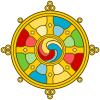

 김지수 기자
김지수 기자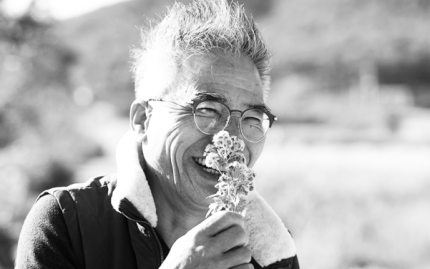 원본보기영화 ‘밥정'과 새 예능 ‘더 먹고 가'에서 힐링 밥상을 차려내는 임지호 셰프. 들꽃같은 방랑식객./사진=고운호 기자
원본보기영화 ‘밥정'과 새 예능 ‘더 먹고 가'에서 힐링 밥상을 차려내는 임지호 셰프. 들꽃같은 방랑식객./사진=고운호 기자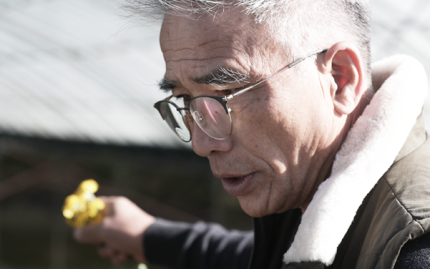 원본보기여섯 살 때 아버지에게 천자문을 배웠다. 12살에 가출 후 밤마다 서양철학과 예술, 전쟁, 사회사를 읽으며 독학했다. 거지에게 기술을 배우라는 말을 듣고 요리에 인생을 걸었다./사진=고운호 기자
원본보기여섯 살 때 아버지에게 천자문을 배웠다. 12살에 가출 후 밤마다 서양철학과 예술, 전쟁, 사회사를 읽으며 독학했다. 거지에게 기술을 배우라는 말을 듣고 요리에 인생을 걸었다./사진=고운호 기자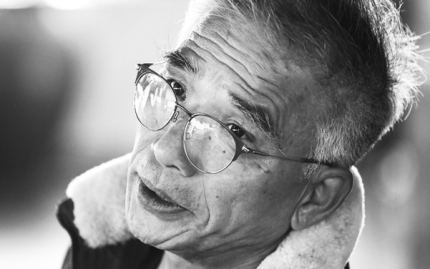 원본보기“사람을 따라가면 사랑이 보여요. 안보이면, 그건 생각이라는 장벽 때문이에요. 생각을 걷어내고 보면 모든 생명에는 사랑이 찰랑대죠.”/사진=고운호 기자
원본보기“사람을 따라가면 사랑이 보여요. 안보이면, 그건 생각이라는 장벽 때문이에요. 생각을 걷어내고 보면 모든 생명에는 사랑이 찰랑대죠.”/사진=고운호 기자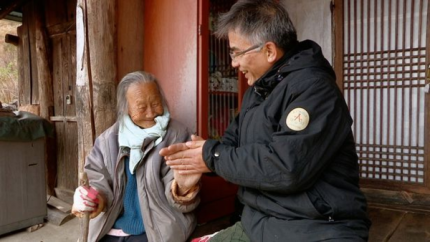 원본보기영화 ‘밥정'의 한장면. 지리산 할머니 김순규와 오손도손.
원본보기영화 ‘밥정'의 한장면. 지리산 할머니 김순규와 오손도손.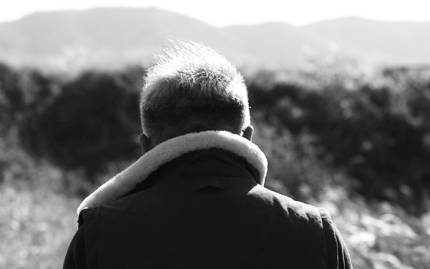 원본보기열두 살 때 경북 안동의 집을 나온 그는 라면집과 중국집·요정 등 전국 각지의 식당을 전전하며 요리를 배웠다./사진=고운호 기자
원본보기열두 살 때 경북 안동의 집을 나온 그는 라면집과 중국집·요정 등 전국 각지의 식당을 전전하며 요리를 배웠다./사진=고운호 기자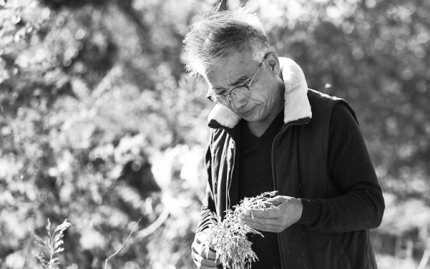 원본보기그는 생명체의 파장을 손으로 느낀다. 식재료를 순식간에 스케치하고 음식을 디자인한다. 20년 동안 그린 미술 작품으로 국내외에서 여러 번 개인전도 열었다./사진=고운호 기자
원본보기그는 생명체의 파장을 손으로 느낀다. 식재료를 순식간에 스케치하고 음식을 디자인한다. 20년 동안 그린 미술 작품으로 국내외에서 여러 번 개인전도 열었다./사진=고운호 기자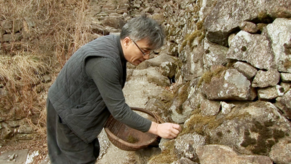 이끼를 채취하는 모습.
이끼를 채취하는 모습. 원본보기벌목꾼처럼 두터운 손. 꽃과 풀은 순식간에 빠르게 뜯는다.
원본보기벌목꾼처럼 두터운 손. 꽃과 풀은 순식간에 빠르게 뜯는다.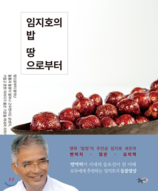 레시피 없는 지연 요리책 ‘임지호의 밥 땅으로부터'. 최근 출간한 이 책에서 그는 아내와 두 딸에게 고마움을 전했다.
레시피 없는 지연 요리책 ‘임지호의 밥 땅으로부터'. 최근 출간한 이 책에서 그는 아내와 두 딸에게 고마움을 전했다.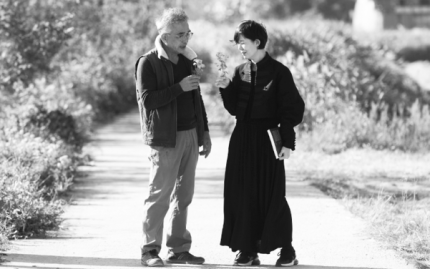 원본보기자연의 일부처럼 되어가는 임지호./사진=고운호 기자
원본보기자연의 일부처럼 되어가는 임지호./사진=고운호 기자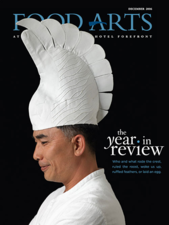 2006년 미국 요리 잡지 ‘푸드 아트’의 표지 모델로 선정된 임지호.
2006년 미국 요리 잡지 ‘푸드 아트’의 표지 모델로 선정된 임지호.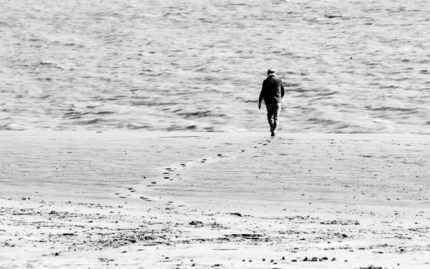 원본보기강화도 외포리 바다./사진=고운호 기자
원본보기강화도 외포리 바다./사진=고운호 기자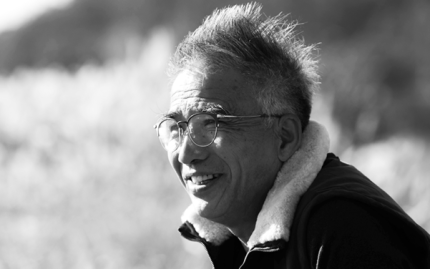 원본보기숙련과 수련으로 단련된 어른, 임지호./사진=고운호 기자
원본보기숙련과 수련으로 단련된 어른, 임지호./사진=고운호 기자